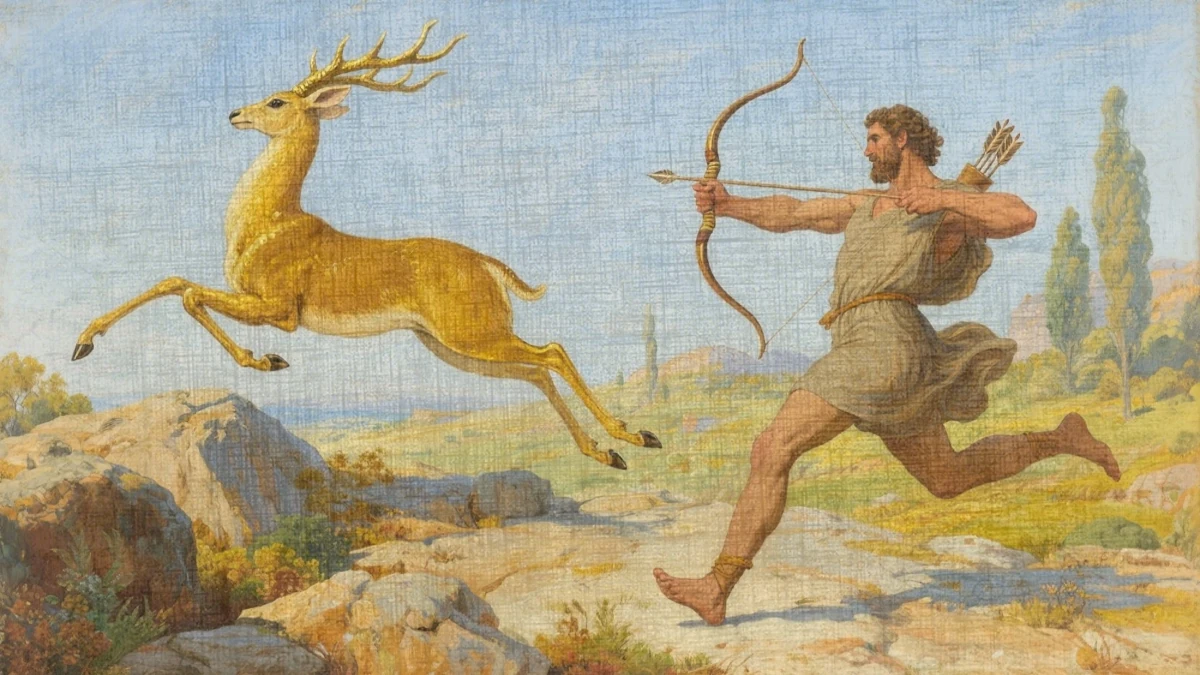Woodcutters gathering kindling in the forests of Arcadia’s mountain slopes once beheld a magnificent hind with golden antlers. She stood atop a steep cliff, but at the sight of humans, she vanished like a whirlwind—only swaying branches and the chime of silver hooves on stone marked her passing.

Word of this wondrous creature spread through the villages, and many hunters sought her. Yet each time they drew near, the hind would disappear into the highland woods. The forest was dense and impenetrable, the peaks seemingly unconquerable. Hunters returned to the valleys declaring no mortal could ever track or catch this elusive beast.
When Eurystheus summoned Heracles for his third labor, he commanded him to capture the Ceryneian Hind alive and bring it to Mycenae. Heracles set out with his companion Iolaus, leaving behind his bow and poisoned arrows. Instead, he carried an axe, a shovel, and a knife.
They carved paths through thickets, chiseled steps into rocky cliffs, and trod trails through tall grass. Felling trees, they bridged mountain streams with logs bound by vines and bark. Across these swaying bridges they crossed chasms, ascending ever higher. Occasionally, the hind would appear—her golden antlers glinting as if beckoning them onward before vanishing again. Patiently, they followed her traces.
They scaled snow-capped peaks, descended into gorges, and forded icy streams. Avalanches showered them with frost; thunderstorms roared overhead. They breakfasted on summits at dawn, sheltered in hollow trees by night, sustained by berries, nuts, and sweet roots—all while climbing higher into the untamed mountains.
The hind began appearing more frequently, as if growing accustomed to their presence. She’d pause to observe them calmly, no longer fleeing in terror. Though killing her would’ve been simple, Eurystheus’ orders were clear: she must be taken alive.
At last, they drove the hind onto a narrow cliffside path where Iolaus lay in wait. Seeing him, she whirled to retreat—only to find Heracles blocking her escape. Trapped at the precipice, she froze. In that moment, Heracles looped a vine rope around her antlers, holding fast until Iolaus arrived. Together, they led their captive down the mountain.
Suddenly, at a forest bend, a radiant woman appeared—clad in a short tunic, bow in hand, quiver at her back. Her eyes flashed with anger as she halted the hunters. The hind immediately nuzzled against her. Stroking the creature, the huntress spoke:
“Greedy mortals! Do the valleys not offer fields enough? Why invade my mountain’s silence? No human foot had tread here… Now you’ve blazed a trail for axes and arrows to frighten my beasts. Why?”
Heracles recognized Zeus’ daughter—Artemis the Huntress.
“Do not wrath, Goddess,” he replied. “We act by your father Zeus’ will, serving mankind. We’ve opened paths to the heights because all earth belongs to humanity. Yet only the brave and strong may follow. Here, the air is pure, the vistas boundless—and those who ascend become nobler.”
Artemis’ gaze softened. She caressed the hind:
“Go. You’ll return to me soon.” Then she vanished among the trees.
Heracles and Iolaus continued their descent. The return journey proved swifter, guided by their own markers. Soon they reached Mycenae, where Heracles presented the hind to Eurystheus. But fearing Artemis’ wrath, the king released it back to Heracles. Remembering the goddess’ words—”You’ll return to me”—Heracles set the creature free, returning it to Artemis’ sacred groves.